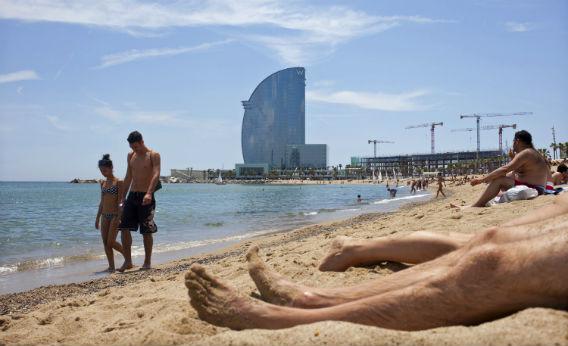Economic chaos and mass unemployment are bad news. But to the curious traveler, they are an opportunity for a bargain. So it’s only natural for a cost-conscious American reading headlines about economic catastrophe in Spain and Greece to wonder: Is there a cheap vacation there for me?
The answer is: not really. The reasons why underscore the difficulties the euro is creating for the continent’s hardest-hit countries. A comprehensive comparison of travel prices is difficult to undertake, of course, but thanks to the rise of soulless international hotel chains we can at least approximate the cost of staying one place rather than another. Try to book yourself into the Madrid Airport Hilton later this month, and you’ll pay a bit more than 100 euros a night. That’s a lot cheaper than the listings I saw for the De Gaulle Airport Hilton near Paris. Prices there were 50 percent higher—or even double—for some May bookings. But the Madrid price is about the same as the $130 or so that the O’Hare Airport Hilton wants here in Chicago. If you want to go to the beach, the Hilton in downtown Miami has May rooms from $159 a night, while the hotel in downtown Barcelona starts at 201 euros, which works out to just over $255. Downtown Athens is 179 euros, also more than $200 a night.
The point isn’t that Spain is an egregiously expensive place to visit. Certainly it’s cheaper than economically stronger western European tourist destinations. But given the incredible weakness of the Spanish economy, it’s hardly the bargain of a lifetime.
And currency dynamics are the key reason. When the euro was introduced, the conversion rates from legacy European currencies were deliberately pegged to try to create rough parity with the dollar. Exchange rates would fluctuate, of course, but the idea was that one euro would equal approximately one dollar or 100 yen. If the euro and the dollar were at parity, Spain would be considerably cheaper for Americans (and all else being equal, Japanese and Brazilians and Chinese, too) to visit. And indeed over the past 12 months, troubles in the European economy have brought the euro and the dollar closer to parity. But compared with where things stood five years ago, the American economy—for all its struggles—has grown a bit, while Spain’s has completely collapsed. The exchange rates in some sense “should” have moved a lot, turning Spain into an American tourist’s paradise.
But they haven’t, because Spain is only a small part of the eurozone. The exchange rate dynamics reflect the overall conditions throughout the currency area, most of which is doing much better than Spain or Greece. Because of Germany’s strength, the euro doesn’t fall across the rest of the continent (just as a recession in Florida doesn’t pull down the dollar in the rest of the United States).
Still, given the dire conditions in Spain or Greece, you might wonder why prices there don’t fall even in the absence of currency adjustments. Why don’t Spaniards and Greeks start charging a lot less for their goods and services? It turns out that prices are “sticky” (i.e., resistant to change) and especially sticky in the downward direction. Some price stickiness derives simply from what are called “menu costs,” in reference to the fact that it would be expensive for a restaurant to print up a whole new set of menus to reflect a minor shift in prices driven by a small increase in the price of food. And think about how you would act in your own life if you suddenly needed to decrease expenditures by 5 percent in response to some bad news. You couldn’t just phone up everyone to whom you owe a fixed sum—your bank or landlord, your cell phone company and cable provider, your auto and health insurers—and try to bargain them down 5 percent. Rather than diminishing expenditures proportionately, you just need to lop some stuff off. Brew your coffee at home instead of wasting money at Starbucks, start packing your lunches, and generally buy less stuff. The problem for an economy in which a whole bunch of people are doing this is that your spending is my income. Individuals cut off whole categories of purchase, and declining firms try to cauterize wounds by shutting entire factories. The growing army of the unemployed does tend to prevent wage increases, but in general the quantity of economic output declines much faster than the prices charged for the remaining output.
The tourist economy is mostly made up of other people’s labor, and in Spain labor costs are rising more slowly than average but not actually falling. What’s more, though wage cuts would certainly help bargain-hunting American travelers, it’s not clear how much good they’d do for the Spanish economy as a whole since they would make the burden of existing debt even greater.
What would solve Spain’s problems are the policies tried by Argentina 10 years ago and Iceland more recently: currency devaluation and repudiation of debts owed to foreigners. When your currency falls, essentially the price of everything drops simultaneously by an equal amount. Your salary falls, but rent payments, phone bills, and pension costs all fall as well. That means everyone needs to pay more for globally traded commodities, which is unpleasant, but it also makes your country a cheap place to visit. And those visitors can rapidly refill the vacant restaurants and storefronts, re-employing workers and bringing growth back to the economy. This isn’t a get-rich-quick scheme—everyone’s wealth takes a hit—but it puts your country in a position for everyone to work hard and start rebuilding rather than sitting idle, depressed, and unemployed. But to turn yourself into a bargain vacation hotspot, it’s not enough to have some nice attractions and a depressed economy. You need your own currency, exactly what Spain and Greece lack.
